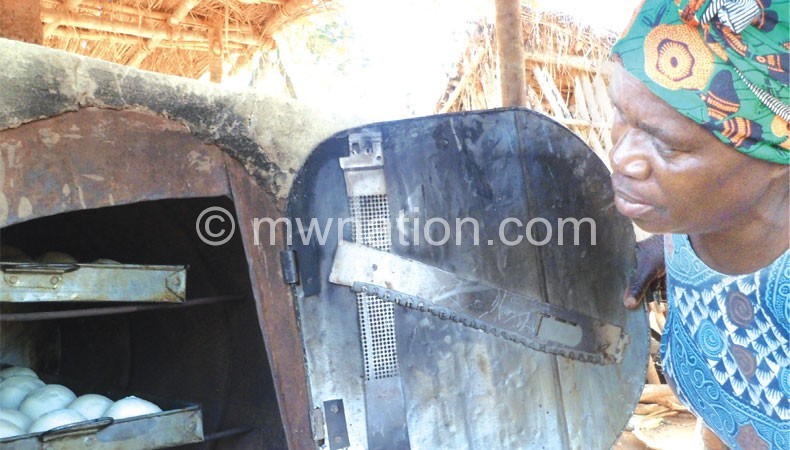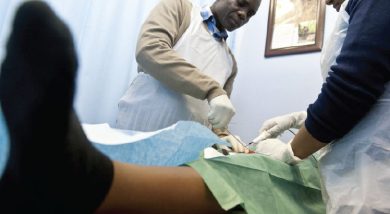Village rebels against poverty

Nine isolated, remote and poor villages in Blantyre Rural are rising beyond their structural constraints to better their lives. In this second part of integrated rural development series, I travelled to one of the villages and tells a story of how the community has rebelled against the vicious cycle of rural poverty.
——————————
Two years ago, Maxwell Gombe, 28, was living in absolute poverty in Kundeketa Village, Traditional Authority Kuntaja in Blantyre.
After marrying in 2007, charcoal making was his only means of livelihood.
But in 2009, the village headman banned charcoal making activities after noting the devastation of vegetation in all the hills surrounding the area. Anyone found cutting down trees was fined three chickens.
The ban managed to protect the environment, but it did not help in protecting Gombe and his family from slipping into destitution.
“I had only built a two-bedroom house, which had no toilet, bathroom or kitchen. I did not have livestock, not even a chicken.
“The only time we could bath was at night when everybody was asleep. We answered natures’ call anywhere,” he recalls.
For the already impoverished family, the ban only worsened matters as Gombe was left without an income generating activity.
Yet, the Gombes were not the only ones affected. The ban unleashed poverty on almost 2 850 households living in the nine different villages under Group Village Head (GVH) Bwanasompho.
These villages—though only located 15 kilometres from Blantyre City—are, geographically isolated and cut out due to a poor road network.
–Hilly terrain–
Furthermore, due to the area’s hilly terrain, agricultural activities are barely a norm, thus most villagers earned their living through the charcoal making business, which led to the complete shaving of hills in the area.
After the ban, Gombe wobbled in search of a sustainable economic activity.
“I needed money to support my family. I needed money to build a toilet because cases of diarrhea were rampant in our village. I didn’t know what to do,” he says.
With the isolation resulting from the poor road network, the people of Kundeketa Village could not even figure which government office to turn to.
Dazed, some of the people in the village turned to their religion: the Catholic Church as explained by Mandinda Zungu, project manager for Catholic Development Commission (Cadecom) of the Blantyre Diocese:
“We received a complaint from the villagers regarding the lack of development in the area. They came to us because they were told about a project we are running in Chileka, Blantyre, which is, at least, 20 kilometres from their village. They argued that they, too, had a need.”
In July last year, Cadecom launched an integrated development project in the nine villages under GVH Bwanasompho and Gombe, from Kundeketa Village, was one of the targeted beneficiaries.
Explains Gombe: “They trained us in a number of areas. I was trained in irrigation farming, village savings loan (VSL), livestock rearing, bee-keeping, sanitation and environment management.
“The main lesson from the training was that our village was not poor. We, the people, were poor because we were failing to maximise our potential by utilising other available recourses apart from trees,” he says.
–Village Savings–
Using the little savings they had and the knowledge obtained from the trainings, Gombe and 20 others formed a VSL group.
“By the beginning of September last year, we had almost K120 000 in our bank. Members of the group started borrowing money from the bank.
“Using the money I borrowed from VSL, I ventured into a small business. I go to Limbe to buy pots which I exchange with chickens at Chavala Market [located an hour walk from Kundeketa]. I sell the chickens in Blantyre City,” he says.
His wife, Esnath, is a member of a women’s group which has been trained in baking. The group members bake scones, dinner rolls and bread for sale in homes, schools and churches.
Leader of the 13-member group, Lenita Donkeyala, says Cadecom provided them capital for the business.
“Each of us borrowed K500 from VSL and contributed to the building of the oven,” she says.
So far, according to Donkeyala, the group has accumulated a profit of K80 000.
“We will share the profits in October. We want to make more. If any of our members has a problem, we allow them to borrow the money at an interest. The interest doubles if the borrower is not a member of the group,” she says.
–Income generating —
Today, Gombe and his wife, both involved in income generating activities, have managed to build a kitchen, a bathroom and, most importantly, a latrine.
“It’s not just any other kitchen. Cadecom trained us to build environmentally-friendly kitchens where you have two fire places that use little firewood.
“We were also trained to make sure that our toilets don’t have germs, and that we should have a bottle of water outside for washing our hands,” says Gombe’s wife.
The household also owns a pig and two goats.
“Some households, including ours, received two goats from Cadecom. When the goats give birth, I will keep the kids and give the two to another family.
“We are not planning on selling the livestock anytime soon. They are our wealth. For now, we are comfortable with the money I get from the chicken business,” says Gombe.
The apparent triumph over by absolute poverty by the Gombes is also story of almost 20 other families in Kundeketa Village. In fact, Gombe’s friend, Legson Sando, who is chairperson of the Village Environment Committee, says cutting down of trees for charcoal making is now history.
“We lived in ignorance for years. Now, with the wisdom bequeathed to us by Cadecom, we are very cautious about conserving the environment.
“We have our own forest which we police every day. Besides that, Cadecom helps us with tree seedlings which we are planting in the bare hills during the rainy season. We want to leave behind a better world to our children,” says Sando, an accomplished agriculturalist who is leading the village in its efforts on modern vegetable farming.
–Turnaround from poverty–
However, despite this apparent turnaround from absolute poverty, there are fears that the locals would flinch if the Cadecom-inspired project comes to an end in two years to come.
But the locals are defiant.
“As a people, we have the desire to see ourselves move from the depth of poverty we were stuck in. That is why we approached Cadecom for assistance.
“Interestingly, Cadecom has largely given us the knowledge, not resources. The resources are here with us and they will always be here. With the knowledge, we will use the resources to maximise our potential,” says Gombe.
Mandinda observes that many people in the nine villages have a scorching desire to lift themselves out poverty.
“For years, we [development-oriented organisations] have thought that we know what the people want. As a result, we impose our development understanding on them. That is why we fail to understand that development is multi-faceted.
“What we are doing is an integrated development where we try as much as possible to help the locals understand how they can utilise various resources under their disposal to meet multi-faceted development challenges they are facing,” she says.





